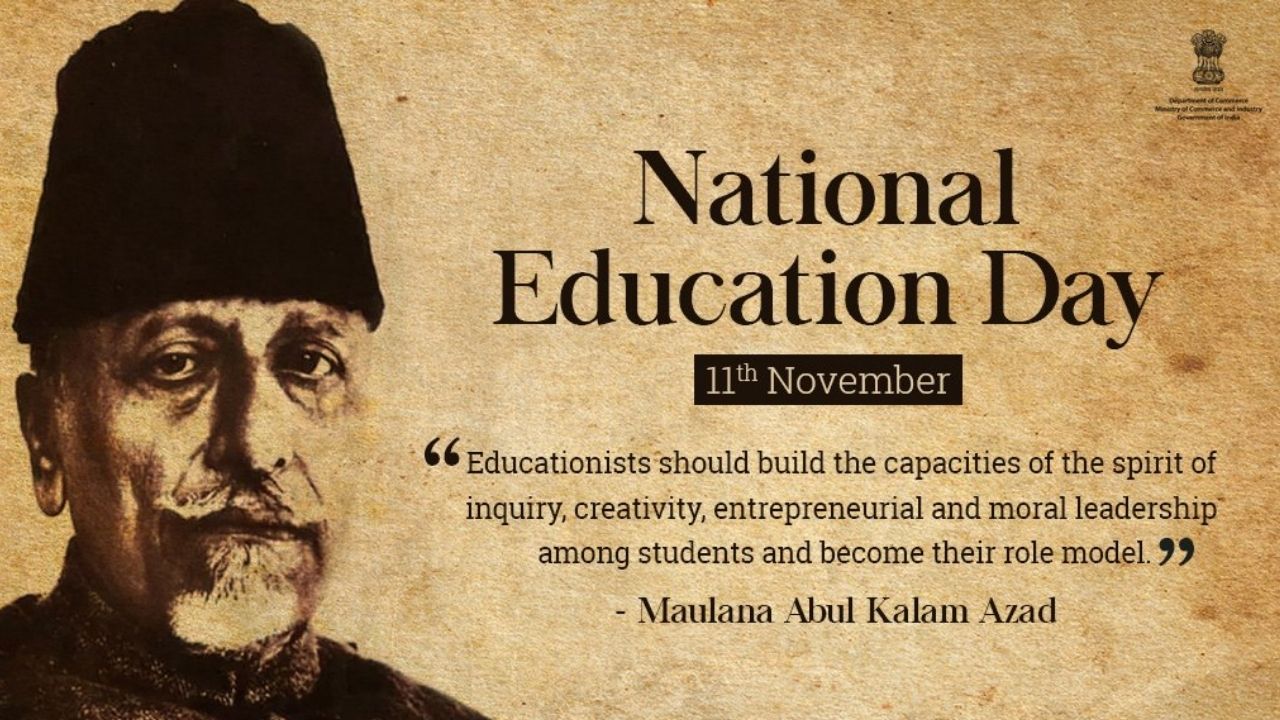National Education Day 2025 is observed across India on November 11 to honor the birth anniversary of Maulana Abul Kalam Azad, the nation’s first Education Minister and a visionary architect of India’s modern education system. The day serves as a reminder of his enduring contributions to building an equitable, inclusive, and forward-looking educational framework that continues to shape the country’s academic landscape.
Celebrated since 2008, the occasion underscores the vital role of education in social and economic development, while encouraging schools, colleges, and universities to organize seminars, debates, and awareness activities that promote literacy and lifelong learning. It is not merely a day of remembrance but an opportunity to reflect on the transformative power of education and to reaffirm India’s collective responsibility toward achieving quality education for all.
What is National Education Day and Why is it on November 11

National Education Day is observed every year on November 11 in India to commemorate the birth anniversary of Maulana Abul Kalam Azad. The date was chosen in 2008 when the Government of India announced that Azad’s birthday would be celebrated nationally to recognize his vision for a modern, inclusive, and research oriented education system. Educational institutions across the country use the day to reflect on how learning shapes individuals and society, and to recommit to accessible, quality education for all.
November 11 is not just a remembrance date. It is a call to action for schools, colleges, universities, and civil society organisations to discuss reforms, reduce barriers to access, improve teaching standards, and foster critical thinking. Activities often highlight digital literacy, foundational learning, skill development, and the integration of technology with pedagogy.
Quick Summary
Key Point |
Details |
|---|---|
Occasion |
National Education Day 2025 |
Date |
November 11, 2025 |
Dedicated To |
Maulana Abul Kalam Azad, India’s first Education Minister |
First Official Observation |
Announced in September 2008 by the then Ministry of Human Resource Development |
Purpose |
To celebrate education as a catalyst for equality, innovation, and nation building, and to honor Azad’s legacy |
Typical Activities |
Seminars, debates, quizzes, essay competitions, teacher appreciation, literacy drives, innovation fests |
Related Global Day |
International Day of Education on January 24 |
2025 Global Theme Mentioned |
AI and education: Preserving human agency in a world of automation |
Official Site Link |
Maulana Abul Kalam Azad: A Life Devoted to Learning and Nation Building
Maulana Abul Kalam Azad was born on November 11, 1888, in Mecca and grew up in Calcutta, where he received a rigorous grounding in Arabic, Persian, and Islamic theology. His intellectual curiosity led him to Western philosophy, science, and literature, shaping a progressive outlook that blended tradition with modernity. As a journalist and public intellectual, he founded influential Urdu weeklies like Al Hilal and Al Balagh, which argued for national unity and questioned colonial policies.
Azad was a prominent figure in India’s freedom struggle, serving as one of the youngest presidents of the Indian National Congress in 1923 and later working closely with Mahatma Gandhi. After independence, he became the first Education Minister of India. His policy stance emphasized universal primary education, adult education, teacher training, technical and vocational pathways, and a robust ecosystem for research and innovation. He viewed education as the bedrock of an equitable and self reliant democracy. In recognition of his contributions, he was posthumously awarded the Bharat Ratna in 1992.
Institutions and Ideas Shaped by Azad’s Vision
Azad’s legacy is visible in the enduring institutions and policy frameworks that still guide Indian education. He advocated for and helped strengthen national bodies that support higher education, technical education, and research. His commitment to excellence and inclusion encouraged the establishment and expansion of premier higher education and research institutions, technical councils, and academies of literature, arts, and music. He championed Indian languages as mediums of instruction, believing that knowledge is most powerful when taught in forms that resonate with learners’ cultural and linguistic contexts.
Beyond formal education, Azad argued for cultural literacy and creative expression. The creation and nurturing of institutions dedicated to literature, fine arts, and performing arts reflected his conviction that education must cultivate imagination and civic responsibility, not just employability.
How National Education Day is Observed Across India
Schools and colleges typically structure the day around meaningful and student centered activities. Some effective ways to mark the occasion include:
- Seminars and panel discussions: Focused on foundational literacy and numeracy, teacher development, equitable access, technology in classrooms, and mental health in education.
- Student competitions: Debates, quizzes, extempore speaking, poster making, and essay writing on themes like critical thinking, ethics, sustainable development, and digital citizenship.
- Innovation and STEM showcases: Mini hackathons, maker fairs, coding challenges, low cost science experiments, and demonstrations that highlight problem solving and teamwork.
- Community outreach: Book donation drives, library readathons, parent literacy sessions, and mentorship for first generation learners.
- Teacher recognition: Felicitation of educators for excellence in pedagogy, student engagement, and community leadership.
- Career and skills workshops: Sessions on vocational pathways, apprenticeships, entrepreneurship basics, financial literacy, and responsible use of AI tools.
The emphasis is on participatory learning that blends academic rigor with creativity and social awareness.
Significance in 2025: Education for Human Agency in a Tech Driven Era
While National Education Day honors a historical legacy, its message is timely for 2025. Around the world, schools and universities are adapting to rapid advances in artificial intelligence, automation, and digital learning environments. The widely discussed global theme for International Day of Education in 2025 highlighted AI and education with a focus on preserving human agency. For Indian institutions celebrating National Education Day, this translates into three practical priorities:
- Digital readiness with equity: Ensure that technology adoption closes gaps rather than deepens them. This includes device access, affordable connectivity, accessible content, and teacher training.
- AI literacy and ethics: Teach students how AI works, what it does well and where it fails, how to detect bias, and how to use it responsibly.
- Human centered outcomes: Keep learning anchored in empathy, collaboration, creativity, and critical inquiry, so that technology supports rather than replaces the human core of education.
Link with International Day of Education
India’s National Education Day on November 11 and the International Day of Education on January 24 reinforce each other. One is a national tribute to a leader who built the foundations of the education system. The other is a global reminder that education drives peace, prosperity, and sustainable development. Together they frame a shared agenda: inclusive and equitable quality education aligned with Sustainable Development Goal 4.
How Schools Can Create a Meaningful Program This Year
- Map each activity to a clear learning objective and a measurable outcome.
- Invite alumni, local educators, or community leaders to speak on real world applications of learning.
- Showcase student projects that address local problems like waste management, water conservation, or traffic safety.
- Include a session on safe and effective use of digital tools and AI for research and creativity.
- Conclude with a student and teacher pledge on inclusivity, academic honesty, and continuous learning.
FAQs
1. Why is National Education Day celebrated on November 11
It marks the birth anniversary of Maulana Abul Kalam Azad, India’s first Education Minister, whose policies and institution building shaped modern Indian education.
2. What is the main purpose of the day
To honor Azad’s legacy and to promote inclusive, quality education that nurtures critical thinking, innovation, and civic responsibility across all levels of learning.
3. How do schools typically observe the day
Institutions conduct seminars, debates, quizzes, innovation fairs, teacher appreciation events, and outreach activities focused on literacy, inclusion, and skill development.
4. Is there a connection with International Day of Education
Yes. India’s National Education Day is observed on November 11, while the world marks International Day of Education on January 24. Both emphasize equitable and quality education for all.
5. Where can I find official updates or resources
Refer to the Ministry of Education, Government of India for policies, announcements, and education related resources.
Conclusion
National Education Day is an invitation to revisit the values that Maulana Abul Kalam Azad championed: universal access, excellence, research, creativity, and social justice. On November 11, 2025, institutions can honor that vision by designing programs that are inclusive, future ready, and rooted in human agency. By aligning classroom practices with ethical use of technology, strengthening teacher development, and supporting student voice, India can keep education at the heart of its democratic and developmental journey.
Official site: https://www.education.gov.in
For More Information Click HERE











